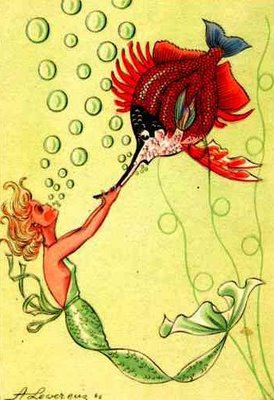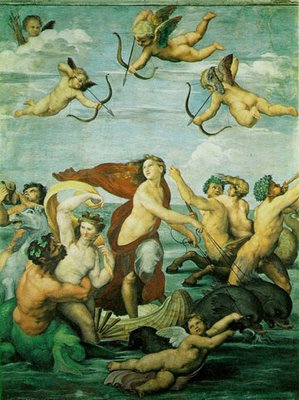Aphroditean Foam

APOSTROPHICS
The chorus faces left to sing
The mind’s first waking day,
Clear and true and unbroken
As the birth of the green world:
Next the antistrophe
Where the chorus turns
Fully the other way, like a
Two-step in reverse,
Retracing This to come to
That on the shore of that
Other truth, the balance pans
Of mind now equalled, paused:
Ready for the second and third
Act. Only She know why
The singers turn, the third
And secret sister of the dance,
Twisting in a chamber far below,
The yearning heart who tides the show.
BIRTH OF VENUS
Ranier Maria Rilke
transl. Edward Snow
On this morning after the night that fearfully
had passed with outcry, tumult, uproar --
all the sea broke open once more and screamed.
And as the scream slowly closed again
and from the sky’s pale daybreak and beginning
fell down into the mute fishes’ chasm--:
the sea gave birth.
The first sun shimmered in the hair-foam
of the wide wave-cleft, on whose rim
the young girl rose, white, confused, and moist.
Just as a piece of new green leaf stirs,
stretches, and something curled up slowly opens,
her body unfolding into the coolness
and into the untouched early morning wind.
Like moons the knees rose clearly
and ducked into the cloud-rims of the thighs;
the calves’ slim shadows pulled back,
the feet flexed and grew luminous,
and the joints came alive like the throats
of people drinking.
And in the pelvis’s cup lay the belly
like a young fruit in a child’s hand.
In its navel’s narrow chalice was
the entire darkness of this bright life.
Beneath it the small wave rose lightly
and lapped continually toward the loins,
where no and then a silent ripple stirred.
But translucent and yet without a shadow,
like a strand of birch trees in April,
warm, empty, and unhidden, lay the sex.
Now the shoulders’ quick scales already
stood balanced on the straight body,
which rose from the pelvis like a fountain
and fell hesitantly in the long arms
and more swiftly in the hair’s cascades.
Then very slowly the face went past:
from the indrawn darkness of its bending
into clear, horizontal upliftedness.
And behind it, steeply closing shut, the chin.
Now, when the neck was stretched out like a jet
and like a stalk in which the sap rises,
the arms too stretched out like necks
of swans, when they are searching for the shore.
Then into this body’s dark dawning
came the first breath like morning wind.
In the vein-trees’ tenderest branches
a whispering arose, and the blood began
to rush louder over its deep places.
And this wind grew on: now it hurled itself
with all its breath into the new breasts
and filled them and pushed into them,--
so that like sails full of distance
they drove the light girl toward the shore.
And thus the goddess landed.
Behind her,
as she strode swiftly off through the young shores,
all morning the flowers and the grasses
sprang up, warm, confused,
as from embracing. And she walked and ran.
But at noon, in the heaviest hour,
the sea rose up once more and threw
a dolphin on that same spot.
Dead, red, and open.
***
KIMBERLEY BLUE
1995
She is a blue stream
winding through
the smoke and booze
long brown hair
and blue blue eyes
the high tide of her body
straining against
the shore of her dress
blue spandex sparkling
like morning water
in this jaded light
She stops before me
with all night behind
all winter outside
all broken hearted
somehow eclipsed
a black aura in
this sapphire's halo
she smiles on me
sweetly & asks
would you like a dance
and I say sure
She lifts her dress
lays it on my lap
reaches behind
to unleash blue lace
and begins to
wave and weave her body
round rich jazz
I inhale her deeply
a musk of jasmine and orchid
and I am only here
in this brilliant shadow
captive to blue billows
dreaming in my balls
Something too strong
for words not a wave
but more than a sigh
washes out of me and
climbs the salmon run
of her dance
Up knees up thighs
to hips whispering
whiskey saxophones and lace
Up smooth belly
to breasts so proud
they startle me
even here
even at such a naked price
When my eyes
rise all the way
I find her
watching me
watching her
for one two three beats
and we're in some other room
too foolish to question
too swollen to ignore
too soon swept away
She smiles and looks
off into the mirror
to admire my lust
glowing on her skin
and devotes her motions
to a deeper blue
and that is that
Around the bar
other women repeat
this dance for other men
each pair a room where
a man tries to drink
deeper than a woman goes
and the night
is an empty glass
on any beach
where just one sip
would surely drown us all

Adonis dwells a third part of the year by himself; for a third part with Persephone; and for a third part with Aphrodite.
... Of the death of Adonis which every year carried him off to Persephone in the Underworld, it was most commonly said that he was wounded by a boar while hunting. His blood rand down, red anemones sprang up from it, and the brook Adonis in Lebanon ran red. It was through that Artemis or Ares sent the boar against the lad.
Aphrodite was thus compelled to mourn for Adonis before she could truly possess him. The festivals for which her woeful love was celebrated were held in commemoration of the day of the love-goddess’s parting from her young lord. He lay there wounded unto death, loved and wept over by Aphrodite. In vain she tried to hold him back. On the next day he soared away through sea and air.
It used to be said, however, that he was still alive. Women brough him little “gardens” -- a symbol and picturesque expression, which was common in our tongue, as in others, for their own femininity. In eastern shrines they gave themselves to strangers. Whoever did not do this must at least sacrifice their hair to Adonis.
-- Carl Kerenyi, The Gods of the Greeks
VENUS AND ADONIS
The having is only a third of
Love, the feasting to the bone
Once cup only that is poured.
And it’s not the first, not the
Second. He is strong and
Separate, hunting boars
Til sunset: Death then takes him
On its tusk: Even the goddess
Of every ripe encounter
Must be broken thus before
Her heart is wakened to
Itself. Veneral surf ever
Slapping at my thighs, you’re
Singing da blues too, crashing
On an empty shore, incessant
In your jones for him
Who climbs highest in departing
On the trellis of her sweet garden.

BLUE IN GREEN
2002
The song enters
gently, almost
painfully so:
Bill Evans on piano
washing in the
night’s minor chords
toward a shore
with no resolution,
blue rollers composed
of the lightest,
most fragile notes,
hesitant as all
who stand at midnight’s door
with so much flowing in
from the night:
And then Miles enters
on trumpet almost too late
in the progression,
not quite an afterthought
but still way after what
ever could have mattered,
that emphysemic
horn thin and spectral
over the wash of minor chords,
hovering like fog over the surf’s
embarcations, wedging us
between what’s
half in and
half out that door
we all hesitated at,
turning for a last long
look back on all we loved and lost
and then lost even more:
There’s no real name for it,
but the feeling is blue in green,
the bittersweet thrall
inside sweet sound;
not the sweetness, but
the crash of that sweetness
when it’s forever gone.
Evans never loses his infinite
restraint throughout,
strolling out those calm,
almost-suicidal progressions
of minor beachside ennui
over which Miles sighs and
sings with a breezy, diffident,
nearly frozen reserve.
Together they weave and sum
the night’s concessions
and conceits,
none of them good or even
passing for a temporary stay
against the facts of dissolution.
Back and forth they
toss that rigorous tao,
ever returning us to
this hard shore:
Then like a long ache
quenched in a needle’s whiteout,
Davis fades off, leaving Evans
to finish things:
The piano climbs that
trellis of sad chords
once more, reaching an even
higher, almost
impossible—
no—
irretrievable height: —then spills
back down
the clef to us
in a quick play
of gorgeous
major thirds,
just as waves will travel
across the world only
to collapse on the shore,
scattering jewels
at our feet before
hauling them all away
in a last low ebb
of minor chords:
“Blue In Green” names
that hard night’s surf
where we lose more than
we ever love, and in so
descending find
that harsh blue door
which scatters us
on a distant,
emerald shore.
THE GARDEN
Jack Gilbert
We come from a deep forest of years
into a valley of an unknown country
called loneliness. Without horse or dog
the heavens bottomless overhead.
We are like Marco Polo who came back
with jewels hidden in the seams of his ragged clothes.
A sweet sadness, a tough happiness.
This beginner cobbles together a kind of house
and makes lentil soup there night
after night. Sits on the great stone
that is a threshold, smelling pine trees
in the hot darkness. When the moon rises
between the tall trunks, he sings without
talent but with pleasure. Then goes inside
to make courtesy with his dear ghosts.
In the morning, he watches the two nuthatches,
the pair of finches with their new son.
And the chickadees. There are chipmunks
in the afternoon finding seeds between
his fingers with their exquisite hands.
He visits his misbegotten garden where
the mint and chives flourish alongside
the few stunted tomatoes and eggplants.
They are scarce because of ignorance.
He wonders all the time where
he has arrived, why so much has been
allowed him (even rain on the leaves
of sugar maples), and why there is
even now so much to come.
-- from Refusing Heaven (2005)
passionate music
2001
That passionate music —
How it erases the one
who meant to ride it,
godlike, on a dolphin’s back.
Love is not personal
though it wakens in a face.
The sweetness of an idea
blooms redolent in
a shared history,
but this music passes,
like spring. And then what?
Trapped in vernals
of I and Thou, I cannot
write poems. It is only
by taking wing
over the embedded
pair that I have any
measures to sing. Not
that the lovers care
for anything more than
their sighs, their sweet
fricative margins.
Oh well —
on this goes.
Eros now husband
to Psyche. Groom of
orchards far beyond
any bed, I waken
and hunger and surrender
to these words. Forget
that passionate singing,
for it can never end.
***
SONG OF THE SEA
Ranier Maria Rilke
Capri, Piccola Marina
Timeless sea breezes,
sea-wind of the night:
you come for no one;
if someone should wake,
he must be prepared
how to survive you.
Timeless sea breezes,
that for aeons have
blown ancient rocks,
you are purest space
coming from afar...
Oh, how a fruit-bearing
fig tree feels your coming
high up in the moonlight.
-- transl Albert Ernest Flemming


<< Home